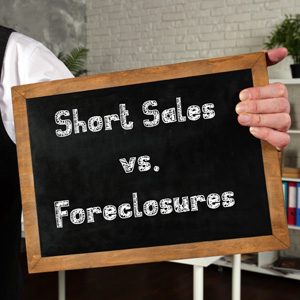Short Sale vs. Foreclosure: What You Should Know

After purchasing your home, there are many situations that may arise which make it difficult to remain current on your mortgage loan. An unexpected financial hardship may affect your ability to meet your monthly mortgage payments, and may place you in danger of losing your home. If you are at risk of losing your Florida home, it is important you know the difference between a short sale and foreclosure.
The Law Offices of Daryl L. Jones, P.A, is a South Florida real estate law firm with over 30 years of experience helping provide clients with the knowledge to understand the difference between a short sale and foreclosure. It is crucial that you know which option may be the best for your case.
What Is the Difference Between a Short Sale and a Foreclosure?
When homeowners find themselves in a position where they can no longer keep up with their mortgage loans, they may be faced with several options regarding their home. Those options may include:
- Foreclosure
- Short sale
- File bankruptcy
- Deed in lieu of foreclosure
While all four options are available to homeowners facing the loss of their home, short sale and foreclosure are the most common.
Understanding a Florida Short Sale
If you owe more money on your mortgage loan than the current market value or sale price of the property, you may be eligible for a short sale. In a short sale, your mortgage lender will accept less than what is owed to them. Your lender may agree to a short sale if they believe it is in their best interest financially. If the lender is made aware that you are unable to pay the amount you still owe on the mortgage, your lender may benefit from the short sale more than another option. This is because a short sale may allow your lender to avoid the cost and time involved in pursuing a foreclosure and resale of the property.
If you choose to pursue a short sale for your Florida home, there are several points you should understand:
- After a properly negotiated short sale, you will be free and clear of the mortgage loan
- You avoid having a foreclosure on your credit report
- You may be able to buy another home within two years or less after the short sale
- The buyer of the property avoids the risks of purchasing a foreclosed property
If you have additional questions concerning a short sale, a Florida real estate lawyer may be able to help.
What Is Foreclosure?
If you have been unable to pay more than three monthly payments on your mortgage, your mortgage lender has the right to pursue foreclosure in Florida. Most lenders are required to notify you prior to filing a foreclosure in court, and must give you at least 30 days to pay the past due balance to avoid the process going any further. If your mortgage loan is not made current within the 30 day time frame, your lender may file a foreclosure lawsuit against you and others who may have an interest in your home with the goal of taking possession of your home to pay off your loan.
Important facts to understand about a foreclosure in the state of Florida are as follows:
- A foreclosure remains on your credit report for seven years
- You will have to wait five years before attempting to purchase another home
Having a knowledgeable attorney on your side will help you navigate the foreclosure process and ensure that you are aware of the repercussions that may befall you as a result.
Get Help From a Florida Real Estate Lawyer
If you find you can no longer keep your mortgage loan current, it may be time to decide if a short sale is a better option for you than permitting a foreclosure of your property. The Law Offices of Daryl L. Jones, P.A, has more than 30 years of experience providing clients with knowledge of short sales versus foreclosures and how they should proceed with either option. When you work with Attorney Daryl L. Jones, you will receive legal guidance from a retired Air Force Colonel, a former board member of a billion dollar bank, and a former Florida State Senator. To schedule a free initial strategy session, contact us here or call 305-969-3602.
